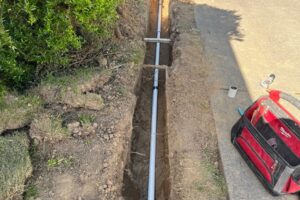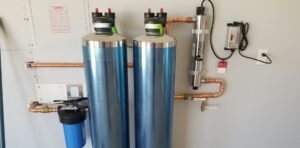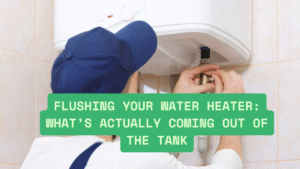When we talk about frozen pipes, most homeowners in Sacramento raise an eyebrow.
“Wait, this is California… how would a pipe even freeze here?”
We get it — we’re not exactly living in snow country. But at Golden Valley Plumbing, we’ve fixed more burst pipes in cold snaps than most people would believe. Because here’s the truth: it’s not just about the outside temperature. It’s about what’s exposed, uninsulated, or forgotten.
When and where we see pipes freeze
Sacramento winters aren’t brutal — but we do get cold nights, especially in the outer suburbs or foothill areas. A 28°F morning doesn’t feel extreme until you realize your outdoor faucet or crawlspace line isn’t protected. That’s when things go wrong.
Here’s where we see trouble most often:
- Hose bibs (exterior faucets) left connected during winter
- Uninsulated pipes in attics, garages, or crawlspaces
- Cabinet pipes on exterior walls in kitchens and bathrooms
- Weekend cabins or rentals left vacant in cold months
- Detached structures (like ADUs or pool houses) with basic plumbing setups
Even a quick overnight freeze is enough to cause a split — and most people don’t notice until the next morning when everything thaws and starts gushing.
Why it happens in “warm” climates
Ironically, homes in warmer states are more vulnerable to freezing because the pipes often aren’t insulated at all. In colder regions, people expect freezing and build for it. Here in Sacramento, we’ve opened walls and found water lines running along bare exterior framing — completely exposed.
One of the worst calls we’ve ever had came from a house with brand-new plumbing — all PEX — but the installer ran the line through an exterior soffit with zero insulation. One cold night, and the line froze solid and split in four places.
What we do (and what you can do)
At Golden Valley Plumbing, we handle frozen pipe calls with urgency — because they don’t wait. We start by locating the break, stopping the flow, and checking for other weak points.
In most cases, that means repairing or replacing damaged water lines before they leak again when the temperature rises.
But the best fix is not letting it happen in the first place:
- Disconnect outdoor hoses in winter
- Add insulation to pipes in crawlspaces, attics, and exterior walls
- Keep cabinets open during cold nights to allow warm air in
- For rarely used properties, shut off water completely and drain lines
Bottom line:
Frozen pipes in Sacramento might not be common — but they’re absolutely real. If your home has plumbing in exposed areas, or if you’ve had a surprise leak after a cold night, Golden Valley Plumbing can help you stay ahead of the next freeze.




